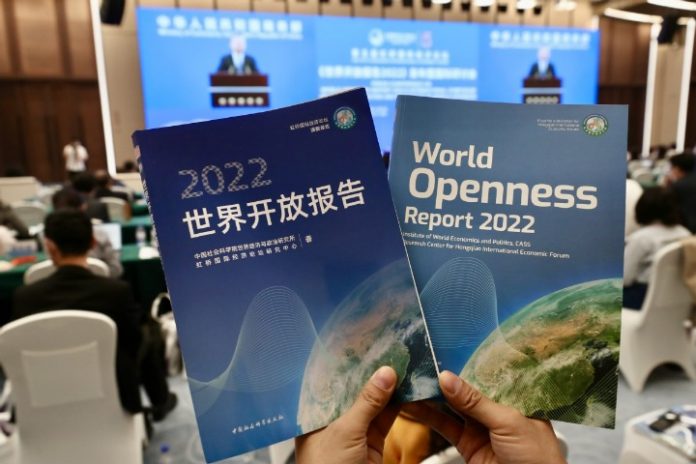Despite the rising protectionism and anti-globalization sentiment around the world, the process of globalization will still roll forward despite the twists and turns it’s facing, senior government officials and top economists said Saturday at a session of the Hongqiao International Economic Forum during the ongoing China International Import Expo.
They made the remarks at the press conference on the World Openness Report 2022 and International Symposium on the Current Situation and Prospects of World Openness, after reviewing the report, which was jointly released by the Institute of World Economics and Politics under the Chinese Academy of Social Sciences, and the Research Center for the Hongqiao International Economic Forum.
Wang Shouwen, vice-minister of commerce and China international trade representative at the Ministry of Commerce, said via video that world openness is at a crossroads as economic globalization is facing headwinds like rising unilateralism and protectionism.
Openness is a must-have for the world to achieve prosperity and development, and “We should expand opening-up to seek higher-quality development,” he said.
Zhou Xiaochuan, former governor of the People’s Bank of China, the central bank, said via video that China is expected to open its door wider still to the rest of the world and unwaveringly share development opportunities with others.
According to the World Openness Report 2022 report, on the overall level, the world openness index continued to show a downward trend in 2020.
Zhang Yuyan, director of the Institute of World Economics and Politics at CASS, said the report showed the distance of “openness” levels between the developed economies and the developing economies is narrowing.
He also said that more driving forces for world openness are emerging, which include the progress in global governance like the achievements of the World Trade Organization’s 12th Ministerial Conference and the implementation of the Regional Comprehensive Economic Partnership, which took effect on Jan 1.
Justin Yifu Lin, dean of the Institute of New Structural Economics at Peking University, said via video that anti-globalization sentiments cannot help the developed countries solve problems and challenges and will bring about obstacles hindering the development of developing countries.
Lin said the report provides a solid theory and index on the importance of openness as well as how to promote economic growth, increase employment, and implement the United Nations’ 2030 Agenda for Sustainable Development.
The report showed that although the overall “openness” level of developing countries was lower than that of developed countries, the openness index of many developed economies showed a downward trend, which reduced the global opening momentum in 2020.
In sharp contrast, economies involved in the Belt and Road Initiative continue to broaden their openness, and the openness index of the BRICS countries has significantly increased, both releasing a positive effect of wider openness, according to it.
Copyright 1995 –
//
. All rights reserved. The content (including but not limited to text, photo, multimedia information, etc) published in this site belongs to China Daily Information Co (CDIC). Without written authorization from CDIC, such content shall not be republished or used in any form.






